Delegate Nguyen Lan Hieu said many medical supplies companies are willing to change product information and offer low bids to squeeze through narrow gaps to win bids at hospitals.
"The purchase and sale of medical supplies is very confusing, there are too many legal regulations, making it difficult to make purchasing decisions that meet the regulations of many different ministries and sectors," Director of Hanoi Medical University Hospital Nguyen Lan Hieu said at the discussion session on socio-economics at the National Assembly on the morning of November 1.
According to Mr. Hieu, the current difficulty of hospitals is that they cannot buy good quality products or develop new techniques. Many poor quality products still pass through the narrow door to win bids at low prices. Many brands are willing to print and revise catalogs to meet requirements and put them on the bidding list.
To prevent this situation, Dr. Lan Hieu proposed solutions to promote warranty criteria, technology transfer, and grouping when bidding for medical supplies. Only good quality companies will accept warranty and maintenance for up to 5 years with training and transfer conditions. If these criteria are specified in specific documents, it will "help the health sector a lot".
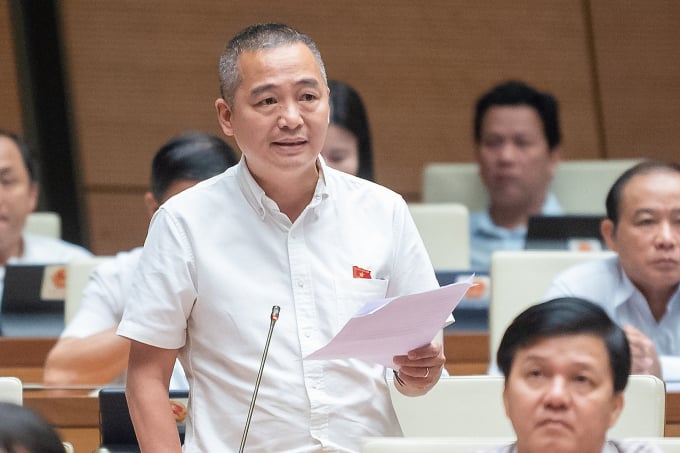
Director of Hanoi Medical University Hospital Nguyen Lan Hieu spoke on the morning of November 1. Photo: National Assembly Media
The director of Hanoi Medical University Hospital also pointed out that for many years now, the licensing of import and use of new instruments in Vietnam has been at a standstill. "I myself have had to take patients abroad for treatment because there are no imported instruments. Big companies see the regulations on procedures and time to get a license and shake their heads in dismay, even withdrawing from the Vietnamese market," said Mr. Hieu.
According to Mr. Hieu, purchasing at provincial hospitals is even more difficult because there are too many approval and inspection steps. Purchasing depends on the Department of Health, Finance, and Provincial People's Committee. Fear of responsibility leads to procrastination, documents are left on the table without being read, and when the deadline is over, they find some minor errors to return to the facility. Therefore, he proposed to assign the main purchasing responsibility to the user of the bid product, giving the hospital the right and responsibility before the law and the patient.
The issue of shortage of medicine and medical supplies was also raised by many delegates to the leaders of the health sector at the discussion session on the afternoon of October 31. Delegate Nguyen Thi Ngoc Xuan (Secretary of Binh Duong Provincial Youth Union) proposed that the Government have a mechanism to refund the cost to people who have to buy medicine and medical supplies outside, even though these items are on the list of items covered by health insurance.
Delegate Pham Khanh Phong Lan (Deputy Director of the Ho Chi Minh City Department of Health) said that this issue had been raised by delegates in previous sessions, but the Government's report was still sketchy about how to handle it. In addition, updating the drug list for patients in Vietnam is also very slow compared to other countries. For example, it only takes about 3 months in Japan, 15 months in France, and 18 months in Korea, but Vietnam takes an average of 2 to 4 years to add a new drug to the health insurance drug list.
The female delegate said that this would deprive people of their rights to health insurance and suggested clarifying the responsibility of health insurance in paying for the money people have to spend to buy medicine.
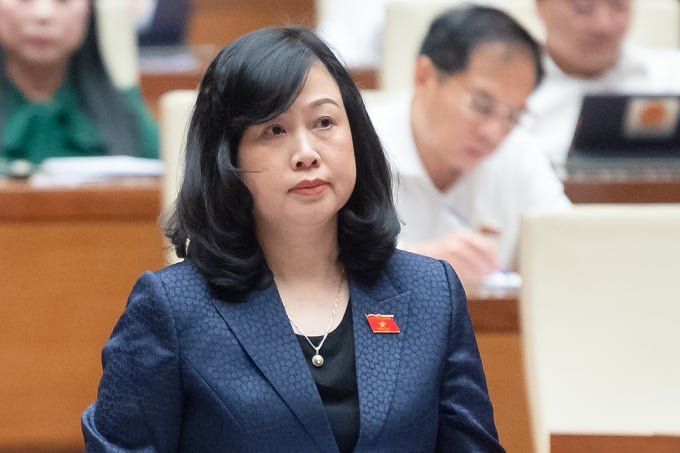
Minister of Health Dao Hong Lan explained the issue of concern to delegates on the morning of November 1. Photo: National Assembly Media
Explaining, Minister of Health Dao Hong Lan admitted that the shortage of drugs and medical supplies is not new, occurring in many countries and is especially serious after the pandemic. The drugs in shortage are mainly used for the nervous system, cardiovascular system, anti-infective, anti-cancer, anti-toxic, digestive system, vaccines and drugs made from human plasma and blood.
The main reasons are the scarcity of raw materials and active ingredients used for production, fluctuating prices, inflation, energy crisis; supply chain disruptions due to military conflicts, and high input costs. Companies lack motivation to produce drugs that bring in little profit.
According to Ms. Lan, drug bidding is currently carried out at all three levels: central, local and medical facilities. The shortage of drugs and medical supplies is due to the inadequate document system, difficulties in organizing procurement and bidding, untimely coordination; in some places, there is still a mentality of apprehension and fear of making mistakes.
The Ministry of Health has proposed that the Government submit to the National Assembly amendments to the provisions of the Law on Bidding, the Law on Prices, the Law on Medical Examination and Treatment, and resolutions of the National Assembly and circulars of ministries and branches to create a legal corridor. "The amended Law on Bidding, effective from January 1, 2024, will remove many obstacles in ensuring the supply and procurement of drugs and medical equipment," said Ms. Lan.
Ms. Lan said that since the beginning of 2023, the Ministry has updated the list of health insurance drugs five times; reviewed the current list to eliminate low-efficacy drugs; and assessed the ability to balance the health insurance fund. Vietnam is considered one of the few countries with a relatively complete list of drugs with more than 1,000 active ingredients, and "not all newly invented drugs are automatically included in the list of health insurance drugs".
"The choice of finished drugs paid for by the health insurance fund is not limited by type, cheap or expensive, domestic or foreign, but is based on disease patterns, patient needs and the fund's ability to pay. Countries update their drug lists regularly because they list drugs under trade names," said Ms. Lan.
Source link


![[Photo] Prime Minister Pham Minh Chinh meets with the Policy Advisory Council on Private Economic Development](https://vphoto.vietnam.vn/thumb/1200x675/vietnam/resource/IMAGE/2025/5/8/387da60b85cc489ab2aed8442fc3b14a)
![[Photo] President Luong Cuong presents the decision to appoint Deputy Head of the Office of the President](https://vphoto.vietnam.vn/thumb/1200x675/vietnam/resource/IMAGE/2025/5/8/501f8ee192f3476ab9f7579c57b423ad)

![[Photo] National Assembly Chairman Tran Thanh Man chairs the meeting of the Subcommittee on Documents of the First National Assembly Party Congress](https://vphoto.vietnam.vn/thumb/1200x675/vietnam/resource/IMAGE/2025/5/8/72b19a73d94a4affab411fd8c87f4f8d)

![[Photo] General Secretary concludes visit to Azerbaijan, departs for visit to Russian Federation](https://vphoto.vietnam.vn/thumb/1200x675/vietnam/resource/IMAGE/2025/5/8/7a135ad280314b66917ad278ce0e26fa)
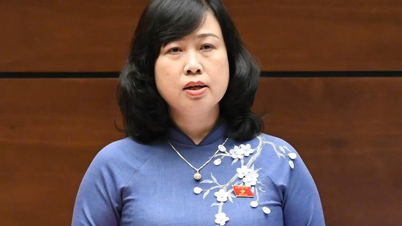





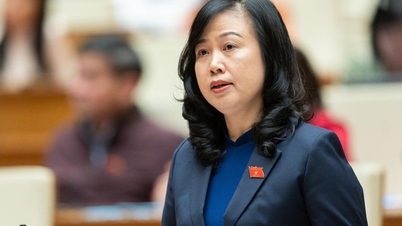
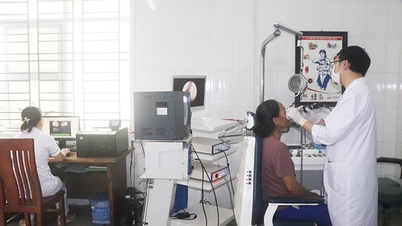

















































![[Photo] Prime Minister Pham Minh Chinh talks on the phone with Singaporean Prime Minister Lawrence Wong](https://vphoto.vietnam.vn/thumb/402x226/vietnam/resource/IMAGE/2025/5/8/e2eab082d9bc4fc4a360b28fa0ab94de)

















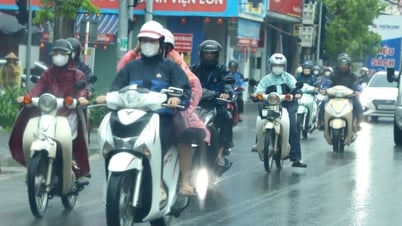
















Comment (0)